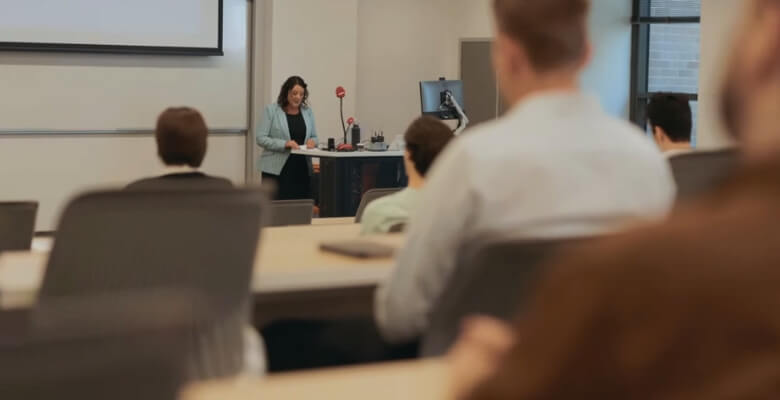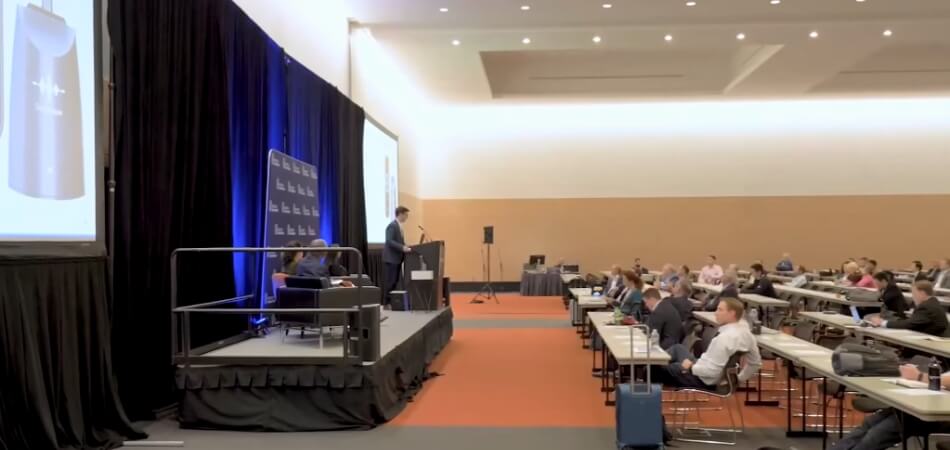An active conference hall, filled with professionals eager to discuss the latest developments in their fields, might be what you envision. But what is an electrical engineering conference?
Basically, an electrical engineering conference is an event where professionals and researchers discuss advancements, challenges, and innovations in electrical engineering, including topics like power systems, electronics, and telecommunications.
Electrical engineering conferences bring together the brightest minds to discuss advances, tackle challenges, and inspire new ideas in the rapidly advancing field of electrical engineering.
Are you curious? Find out what an electrical engineering conference is and discover the electrifying universe that awaits you. We will explore the intricacies of these transformative conferences together.
What is the Main Purpose of the Conference?
The main purpose of an engineering conference is to bring together professionals, researchers, and students to advance knowledge, share innovations, and promote collaboration. These events provide a platform for experts to discuss advancements in technology and explore future challenges. Below are some common purposes of the conference:

- Knowledge Sharing: Conferences provide a space for presenting the latest research and technological advancements. Attendees gain insights into innovative solutions and innovative methodologies from various fields.
- Networking Opportunities: These events encourage interactions between professionals, researchers, and students from around the world. Building connections can lead to collaborations and new career opportunities.
- Collaboration and Innovation: Conferences foster partnerships by bringing experts together to solve industry problems. Collaborative efforts often lead to groundbreaking ideas and advancements in engineering.
- Professional Development: Attending any electrical engineering conference helps participants stay updated on industry trends and emerging technologies. Workshops and seminars offered at these events also contribute to personal and career growth.
What is an Electrical Engineering Conference?
Electrical engineering conferences are vibrant gatherings where professionals convene to explore advancements in the field. Wondering, “What is an electrical engineering conference?” Here’s a closer look at this exciting event.
An electrical engineering conference is a gathering of professionals, researchers, educators, and students in the field of electrical engineering. These conferences provide a platform to share knowledge, discuss advancements, and network with others who share similar interests.
At an electrical engineering conference, attendees can expect a variety of activities, including keynote speeches from industry leaders, technical presentations on the latest research, and panel discussions that explore emerging trends and challenges. Workshops and hands-on sessions often allow participants to dive deeper into specific topics, providing practical insights that can be applied to their work.
Networking is a crucial aspect of these conferences. Participants have the opportunity to meet peers, establish professional connections, and collaborate on future projects. This interaction can lead to new partnerships, job opportunities, and a broader understanding of the industry.
In addition to technical content, many conferences also feature exhibitions showcasing the latest technologies, products, and services in the electrical engineering field. These exhibitions allow attendees to explore innovative solutions and gain insights into industry developments.
An electrical engineering conference is not just about learning; it’s a chance to be part of a vibrant community passionate about advancing the field. Whether you’re a seasoned professional or a student just starting out, these events can offer invaluable experiences that inspire and inform your career.
Key Features of Electrical Engineering Conferences
Technical Presentations and Papers
Participants often present research papers that contribute to the body of knowledge in electrical engineering. These presentations cover a wide range of topics, from circuit design and power systems to telecommunications and robotics. Attendees can gain insights into innovative research and practical applications.
Keynote Speakers
Renowned experts in the field are invited to deliver keynote addresses. These speakers share their insights on current trends, challenges, and future directions in electrical engineering. Their experience and knowledge provide valuable perspectives that can inspire and inform attendees.
Panel Discussions
These sessions typically involve a group of experts discussing specific topics or challenges facing the industry. Audience members can participate by asking questions, leading to engaging discussions and diverse viewpoints.
Workshops and Tutorials
Many conferences offer hands-on workshops that allow participants to delve deeper into specific subjects. These interactive sessions provide practical skills and knowledge that attendees can apply in their work or studies.
Networking Opportunities
One of the major advantages of attending an electrical engineering conference is the opportunity to connect with peers, industry leaders, and potential collaborators. Through networking events, casual meet-ups, and social activities, attendees can build meaningful relationships that may pave the way for future partnerships or job opportunities. These connections are among the top reasons to attend electrical engineering conferences, as they can significantly enhance your professional journey.
Exhibitions
Conferences often feature exhibitions showcasing the latest technologies, products, and services from various companies and research institutions. This gives attendees a firsthand look at innovations in the field and provides opportunities for companies to demonstrate their solutions to potential clients.
Professional Development
For students and early-career professionals, these conferences can be invaluable for career growth. They offer exposure to industry practices, trends, and potential job openings, as well as opportunities to connect with mentors.
What Happens at an Engineering Conference?
Curious minds often wonder, “What happens at an engineering conference?” Here are a few things you need to know about this exciting conference of industry experts:
- Renowned professionals and researchers deliver keynote speeches, sharing insights into the latest advancements and future trends in engineering disciplines.
- Engaging panel discussions bring together experts to debate and study deeper into specific topics, offering various perspectives and raising critical thinking.
- Attendees have the opportunity to participate in hands-on workshops and tutorials, where they can learn new skills, techniques, and tools relevant to their field.
- Networking is a key component of engineering conferences, providing attendees with opportunities to connect with peers, mentors, potential collaborators, and industry leaders.
- Researchers showcase their latest projects and findings through poster presentations, offering a visual representation of their work and facilitating discussions with fellow attendees.
- Engineering conferences often feature an exhibition hall where companies, organizations, and academic institutions showcase their products, services, and research initiatives.
- Social events such as receptions, dinners, and social mixers provide attendees with opportunities to relax, unwind, and network in a more informal setting.
- Many engineering conferences host career fairs where attendees can explore job opportunities, connect with recruiters, and learn about career development resources.
- Some conferences facilitate collaborative projects or hackathons where attendees can work together to solve real-world problems and showcase their creativity and problem-solving skills.
- Engineering conferences may offer professional development sessions, covering topics such as leadership, communication, and career advancement strategies.
Why Attend an Electrical Engineering Conference?
A conference on electrical engineering has your curiosity offended? Here are some compelling reasons why attend an electrical engineering conference:
Stay Updated on Industry Trends
Attending electrical conferences keeps you abreast of the latest advancements, trends, and innovations in electrical engineering. From innovative research to emerging technologies, you’ll gain valuable insights that can shape your work and career development.
Expand Your Knowledge
Engage in engaging discussions, attend workshops, and participate in hands-on sessions to expand your knowledge and skill set. Whether you’re a seasoned professional or a budding engineer, conferences provide opportunities for continuous learning and professional growth.
Showcase Your Work
Presenting your research, projects, or ideas at conferences allows you to gain recognition and feedback from your peers. It’s a chance to share your expertise, contribute to the collective knowledge of the field, and establish yourself as a thought leader in your niche.
Gain Inspiration
Engage yourself in an environment buzzing with creativity, innovation, and passion for electrical engineering. Conferences are hubs of inspiration, where you can gain fresh perspectives, spark new ideas, and reignite your enthusiasm for your work.
Build Lasting Connections
Beyond professional networking, conferences provide opportunities for building lasting friendships and connections with like-minded individuals. Sharing experiences, challenges, and triumphs with your peers encourages a sense of community and support within the field.
Who Participates in Electrical Engineering Conferences?
Have you ever wondered who’s behind the buzz at electrical engineering conferences? Here are some of the different participants:
- Industry Professionals: Engineers, technologists, and professionals working in industries such as power, electronics, telecommunications, and automation actively participate to stay updated on industry trends.
- Researchers and Academics: Scholars, researchers, and professors from universities and research institutions contribute their expertise through presentations, workshops, and discussions.
- Students: Both undergraduate and graduate students pursuing degrees in electrical engineering attend to gain insights, network with professionals, and explore potential career paths.
- Government Representatives: Representatives from government agencies, regulatory bodies, and policymakers often attend to discuss regulatory frameworks, standards, and policy implications in the field of electrical engineering.
- Entrepreneurs and Innovators: Entrepreneurs, startup founders, and innovators showcasing disruptive technologies and solutions participate to gain exposure, seek investment opportunities, and network with potential partners.
- Industry Leaders: Executives, managers, and decision-makers from leading companies and organizations participate to stay ahead of the curve, forge strategic partnerships, and gain insights into industry best practices.
- Consultants and Service Providers: Professionals offering consulting services, engineering solutions, and technical expertise participate to showcase their offerings, expand their client base, and stay connected with industry trends.
- Professional Associations: Representatives from professional associations and industry groups play a vital role in organizing and supporting conferences, raising collaboration, and advocating for the profession.
- International Delegates: Participants from around the globe bring different perspectives, experiences, and insights, enriching the conference discussions and nurturing global collaboration in the field of electrical engineering.
Most of Your Experience at an Electrical Engineering Conference
Preparing to attend an electrical engineering conference? Maximize your experience with these practical steps:
Step 1: Plan Ahead
Take the time to review the conference schedule ahead of time, identifying sessions, workshops, and presentations that align with your interests and professional goals. Prioritizing your schedule will help you make the most of your experience and ensure you don’t miss out on valuable opportunities. This approach is especially helpful when finding upcoming electrical engineering conferences, as it allows you to plan your attendance effectively.
Step 2: Engage Actively
Participate in discussions, ask questions during Q&A sessions, and connect with fellow attendees during networking breaks. Actively engaging with speakers and peers can enhance your learning experience and expand your professional network.
Step 3: Take Notes
Bring a notebook or use a note-taking app to jot down key insights, ideas, and action items throughout the conference. Reflecting on your notes later will reinforce learning and help you implement new strategies or concepts in your work.
Step 4: Network Strategically
Approach networking with a strategic mindset by setting specific goals, such as meeting professionals in your field of interest or connecting with potential collaborators. Exchange contact information and follow up with meaningful conversations after the conference.
Step 5: Visit Exhibits
Investigate the exhibition hall to discover new products, technologies, and services relevant to your work. Engage with exhibitors to learn more about their offerings and how they can support your projects or research.
Step 6: Attend Social Events
Take advantage of social events such as receptions, dinners, and mixers to network in a relaxed setting and build relationships with fellow attendees. Remember to exchange business cards and follow up with contacts afterwards.
Step 7: Stay Energized
Maintain your energy levels throughout the conference by staying hydrated, taking breaks when needed, and nourishing your body with nutritious snacks. A balanced approach to self-care will ensure you can fully engage and make the most of your experience.
Step 8: Reflect and Follow Up
After the conference, take time to reflect on your learnings, insights, and connections made. Follow up with new contacts, review your notes, and consider how you can apply what you’ve learned to your work or research projects.
Frequently Asked Questions
Here are answers to some frequently asked questions to help you better understand these exciting conferences:
What Can I Do to Maximize My Conference Experience?
To maximize your experience, plan ahead, engage actively, take notes, network strategically, visit exhibits, attend social events, stay energized, reflect on your learnings, and follow up with contacts after the conference.
What Topics Are Typically Discussed at Electrical Engineering Conferences?
Topics include but are not limited to power systems, electronics, telecommunications, renewable energy, control systems, robotics, artificial intelligence, cybersecurity, and emerging technologies shaping the future of electrical engineering.
How Can I Get Involved in Organizing an Electrical Engineering Conference?
You can get involved by joining committees, submitting proposals for presentations or workshops, volunteering to help with logistics, or becoming a sponsor or exhibitor to showcase your organization’s contributions to the field.
What Can I Expect from Attending an Electrical Engineering Conference?
Attendees can expect to participate in presentations, panel discussions, workshops, networking events, poster sessions, and exhibitions, providing opportunities for learning, collaboration, and professional development.
Electrical Engineering Conferences: What Should I Know?
To maximize your experience, plan by reviewing the schedule, actively engaging in sessions and networking opportunities, taking notes, visiting exhibits, and following up with contacts after the conference.
Last Words
Attending an electrical engineering conference offers a plethora of opportunities for growth, networking, and innovation. From engaging in insightful discussions to developing valuable connections, these gatherings are essential for professionals in the field. Attendees can maximize their experience by actively participating in sessions, networking strategically, and staying energized.
Think about the vibrant atmosphere, the wealth of knowledge, and the opportunity for collaboration next time you’re contemplating whether to attend. Hold the opportunity to engage yourself in electrical engineering and discover the endless possibilities for learning and growth. So, what is an electrical engineering conference? It’s more than just a gathering it’s a catalyst for progress and innovation in the field.







